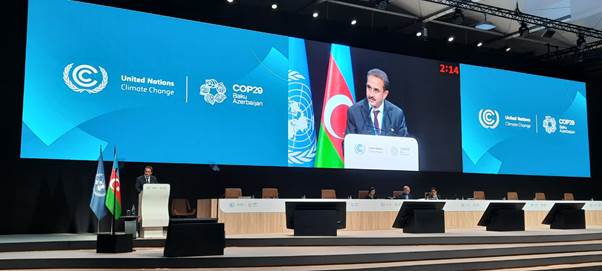
India asked Developed Nations at COP29 to provide enough carbon space for Developing countries to develop.
Baku: Claiming that huge costs are being imposed on a Developing Country like India for undertaking climate actions, India today asked the Developed Countries to show leadership in mitigation actions, as required under the Paris Agreement, by not just advancing their net zero targets but providing enough carbon space for Developing countries to develop.
India’s statement noted that the high carbon emission development pathways of the Global North in past left very little carbon space for the Global South.
Reminding the gathering that the Nationally Determined Contributions (NDCs) are due for submission the next year, India stated that the breach of carbon space seems imminent towards the end of this critical decade.
“The decisions at COP29 should be guided by the core principles of “Equity, Climate Justice and Common but Differentiated Responsibilities and Respective Capabilities” provided in the UNFCCC and its Paris Agreement,” Union Minister for Environment, Forest and Climate Change, Kirti Vardhan Singh, said while delivering India’s ‘National Statement’ at the High-level Segment of the CoP29 of the United Nations Climate Change Conference here today.
He asserted that the context of different national circumstances, sustainable development goals and poverty eradication, particularly in respect of the Global South should not be lost sight of.
“Despite not contributing to the problem, we in the Global South are bearing a huge financial burden on account of climate actions for mitigation on the one hand, and losses and damages caused by climate change on the other, thus severely limiting our capacity to meet our developmental needs. But these have not dampened India’s resolve and commitment to take ambitious climate actions,” Singh, said.
India called out some of the developed countries that have resorted to unilateral measures making climate actions more difficult for the Global South. The statement said that raising climate ambitions to align with Paris Temperature Goals has to be preceded by the free availability of green technologies, producing them on scale and availability of finance for their deployment, particularly in the Global South.
“In the emergent situation, there is no option but to break all barriers to the flow of technology, finances and capacity to the Global South. The theme of this COP – ‘enabling actions and enhanced ambition’ is very relevant in this context. CoP29 is the COP for Climate Finance – the New Collective Quantified Goals (NCQG) on Climate Finance for mobilizing climate finance for meeting the needs and priorities of Developing Countries,” Singh said. He added, “What we decide here on NCQG must be founded on the principle of Climate Justice. The decisions must be ambitious and unambiguous, taking into consideration the evolving needs and priorities of the Developing Countries, and their commitment to sustainable development and eradication of poverty.”
Stressing that the growth trajectories for fulfilling the primary needs of sustainable development and poverty eradication cannot be compromised, Singh urged all participants to work with determination towards making the CoP 29, meaningful and impactful in its outcomes.
Also read:
- COP29: India claims no progress in matters critical for developing countries
- COP29: India seeks $1.3 trillion annual grants to developing nations till 2030
“Please be assured of India’s full cooperation for a successful COP29,” Singh said. He stressed that all nations needed to put up a collective fight against Climate Change, under the UNFCCC and its Paris Agreement.
“What we decide here, will enable all of us, particularly those in the Global South, to not only take ambitious mitigation action but also adapt to Climate Change. This COP is historic in this context,” he said.
Informing the gathering about India’s initiatives towards combating Climate Change, Singh said that the country has achieved the 2015 NDC [Nationally determined contributions are at the heart of the Paris Agreement and the achievement of its long-term goals] targets on emission intensity reduction and non-fossil based installed electricity generation capacity much earlier than 2030 and have further enhanced its ambition.
The Minister talked about how India’s renewable energy capacity has nearly tripled from its 2014 levels and the country is on the course to achieve the 500 GW target by 2030. Further, he said, “India has launched the Mission LiFE- Lifestyle for Environment to encourage sustainable lifestyle practices at the global level. Mission LiFE inspires individuals, communities and societies to exercise choices and behaviours that focus on mindful utilisation of resources.”
Talking about how India is at the forefront of pro-planet actions, Singh stated, “The campaign – ‘Ek Ped Maa ke Naam’ – was launched by Prime Minister Narendra Modi, on World Environment Day 2024, wherein one billion saplings have been planted already. ‘Plant4Mother’, which exhorts everyone to plant a tree as a mark of love, respect and honour of our mother and Mother Earth has resonated across the spectrum because of its powerful, inspirational and emotional connect”.
Furthermore, the Indian statement informed about its initiatives like the International Solar Alliance, Coalition for Disaster Resilience Infrastructure (CDRI), Global Biofuel Alliance, Leadership Group on Industry Transition and Resource Efficiency and Circular Economy Industry Coalition that have been launched with different partner countries, in pursuance of global climate actions.
It may be mentioned that yesterday at the G20 Summit in Rio De Janeiro in Brazil, Indian Prime Minister Narendra Modi referred to India as having developed over 2000 climate-resilient crop varieties, stressing that the focus was on sustainable agriculture, protection of the environment, nutrition and food security by promoting millet.
– global bihari bureau





